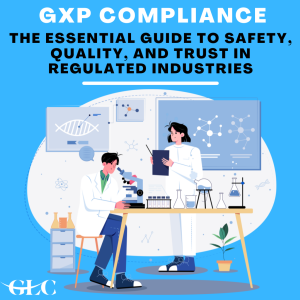Free knowledge to monitor the world of events. Have a look at our must read Blogs on Pharma, Finance, HR, Health and Cross Industry.
GxP Compliance
2022-08-16
The Essential Guide to Safety, Quality, and Trust Across Regulated Industries
Introduction
In the world of regulated industries, GxP compliance is the basic foundation without which the notion of safety, quality, and efficacy would merely be an abstraction for such disparate products as pharmaceuticals, medical devices, food, and cosmetics. Be it a new drug in a clinical trial or a vaccine that gets to its destination under tight cold-chain conditions, it is the invisible GxP standards behind its quality. If the term GxP sounds rather technical, it is an acronym for "Good [X] Practice", where "X " refers to various aspects like manufacturing, clinical trials, and laboratory testing. This article looks at GxP compliance; it details what constitutes it, what the requirements are from a regulatory perspective, and its importance across industries.

- What is GxP Compliance and Why Does it Matter?
GxP is the general term that covers a set of regulations ensuring the product meant for human and animal use would be produced with quality standards, from its research and development to manufacturing and distribution. Its key drivers towards compliance include:
- Patient Safety: It will protect the consumer from harm by ensuring the products are safe for their intended use.
- Product Quality: This reduces the chances of defects and contamination throughout the supply chain.
- Data Integrity and Traceability: It ensures processes are appropriately documented and auditable.
These rules are of critical importance for such industries as pharmaceuticals, food, medical devices, and cosmetics, where a slight non-conformity may turn into life-threatening results or huge fines.
- Proof of GxP's Impact: A Real-World Example
In 2020, the FDA issued a warning letter to a well-known pharmaceutical manufacturing company due to violating Good Manufacturing Practices. Among the various observations, inspectors found that the company failed to maintain data integrity; several records related to quality control were incomplete or fraudulent. The incident led to production delays, financial loss, and damage to reputationyet another indication of just how very vital compliance is in respect to trust and safety. Without GxP oversight, such lapses in discipline allow defective drugs to reach consumers and thus put lives at risk.
- Deconstructing Main Elements of GxP Compliance
- Good Clinical Practice (GCP):
For the manufacturing, testing, and quality assurance of drugs to ensure that they are safe for human consumption. GMP is relevant if your operations involve the production of pharmaceuticals. The ICH sets guidelines for GCP around the world; these are adopted by the regulatory agencies of the FDA, EMA, and TGA.
- Good Laboratory Practice (GLP):
GLP governs the conduct of all non-clinical studies conducted to assess the safety and efficiency of chemicals before they enter either clinical trials or markets. Such is the case, for instance, when APIs and pesticides are properly tested through GLP to prevent further advancement into the product pipeline for contaminated or unsafe chemicals.
- Good Manufacturing Practice (GMP):
GMP governs the manufacturing and handling of a product during processing to ensure quality control standards. A GMP-compliant facility should employ rigid sanitization, equipment maintenance, and documentation practices. The FDA, EMA, and WHO are some of the main regulatory bodies involved in periodic inspections aimed at ensuring the application of GMP rules. For instance, 21 CFR Part 211 outlines the minimum GMP requirements applicable to manufacturers of pharmaceutical products in the US and addresses discussions on issues such as sanitation, batch traceability, and staff training.
- GxP Compliance Beyond Pharmaceuticals: Food and Cosmetics
Although GxP is associated with the pharmaceutical industry, it applies to food production and the manufacturing of cosmetics. In the case of foods, for instance, GMP guidelines by the FDA ensure that the products are prepared under conditions that minimize the risks of contamination and impurities. In cosmetics, it helps companies avoid harmful chemical contamination and therefore guarantees the safety of such products for consumer use.
- Challenges in Maintaining GxP Compliance
GxP compliance is very vital; however, there are some challenges that have posed obstacles for companies, including the following:
-Various Regulatory Requirements: Because regulations differ in each country, it may be impossible for any multinational organization to adhere to all requirements.
-Data Integrity: Many organizations around the world have plunged into digital operation and maintenance of data. Ensuring data security and its accuracy is primary and paramount in this regard.
-Training and Awareness: Employees must be Sufficiently educated on GxP requirements so that unintentional non-compliance does not occur.
- Best Practices to Achieve and Maintain GxP Compliance
The following best practices in ensuring compliance are worthy of consideration by companies:
- Establish Standard Operating Procedures (SOPs):
It ensures that the employees are clear about executing tasks per the regulatory standards through clear and detailed SOPs.
- Conduct Regular Audits:
Internal and external audits afford the identification of compliance gaps and also provide opportunities for improvement.
- Invest in GxP-Compliant Software:
Many companies today depend on ERP systems for management and LIMS to maintain records and automate processes in order to meet GxP requirements.
- Employee Training Programs:
Through continuous training, the employees are always on the market with facts about the newest regulations and their duties so that compliance is preserved.
- Consequences of Non-Compliance
The penalties associated with non-compliance to GxP requirements have serious consequences, as will be shown below:
- Regulatory Sanctions: The companies may be fined, experience other penalties, or even have their licenses revoked.
- Product Recalls: Products of less than expected quality may be recalled. This is an expensive process and also affects the company's reputation.
- Consumer Lawsuits: Companies risk being dragged to court in the event of harmful contaminants from non-compliant products.
Conclusion
The compliance of GxP is far beyond the requirement of regulations but is an assurance of safety, quality, and integrity across industries: from clinical trials of new drugs to the manufacturing of common cosmetics. It makes sure that all products must follow the highest standards throughout their lifecycle. Companies that embrace compliance with GxP will avoid penalties, but most importantly, gain the trust of regulatory authorities, healthcare professionals, and consumers. With increased examination by regulatory bodies coupled with growing consumer awareness, there has never been a better time to be compliant with GxP.
In short, GxP forms the backbone of industries that touch our lives day in and day out, right from medicine to cosmetics, ensuring that these products are safe, effective, and reliable. The companies should remain proactive, taking advantage of technology, audits, and training to ensure continuous compliance within the ever-evolving regulatory landscape.
Join our Pharma Masterclasses today Gain valuable insights, and practical knowledge, and network with industry experts.
By Shara Najimudeen, Digital Marketing Executive, GLC Europe, Colombo Office, Sri Lanka.
Get a feel for our events

Training Program for CMC Leaders - EU edition
14th September 2026 - 09th April 2027
Rich with practical insights and real-world applications
learn more >>
Training Program for CMC Leaders - US edition
14th September 2026 - 09th April 2027
Rich with practical insights and real-world applications
learn more >>
Advanced Stability Testing of Pharmaceuticals MasterClass - US edition
24-27 February, 2026
Increase the likelihood of studies receiving regulatory approval
learn more >>












